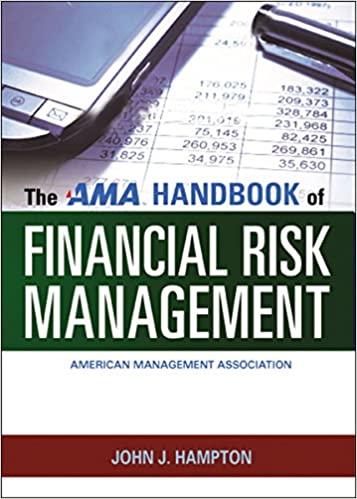Question
When there is leverage, a conflict of interest exists if investment decisions have different consequences for the value of equity and the value of debt.
When there is leverage, a conflict of interest exists if investment decisions have different consequences for the value of equity and the value of debt. Such a conflict is most likely to occur when the risk of financial distress is high. In some circumstances, managers may take actions that benefit shareholders but harm the firms creditors and lower the total value of the firm. This means that when firms are highly levered up, they face very high cost of debt, enough to compensate the creditors agency costs.
What category does the above statement fall under? UNDERINVESTMENT PROBLEM PECKING ORDER THEORY AGENCY COST OF DEBT TRADEOFF THEORY
Actual corporate leverage ratios typically do not reflect capital structure targets, but rather the widely observed corporate practice of financing new investments with internal funds when possible and issuing debt rather than equity if external funds are required. In this capital structure theory, an equity offering is typically regarded as a very expensive last resort.
What category does the above statement fall under? UNDERINVESTMENT PROBLEM PECKING ORDER THEORY AGENCY COST OF DEBT TRADEOFF THEORY
Although the direct expenses associated with the bankruptcy process appear small in relation to market values, the indirect costs can be substantial. For many companies, the most important indirect cost is the loss in value that results from cutbacks in promising investment when the firm gets into financial trouble.
What category does the above statement fall under? UNDERINVESTMENT PROBLEM PECKING ORDER THEORY AGENCY COST OF DEBT TRADEOFF THEORY
As the level of debt increases, the value of the firm increases from the interest tax shield (TC xD) as well as improvements in managerial incentives. If leverage is too high, however, the present value of financial distress costs, as well as the agency costs from debt holderequity holder conflicts, dominates and reduces firm value. The optimal level of debt, D*, balances these benefits and costs of leverage.
What category does the above statement fall under? UNDERINVESTMENT PROBLEM PECKING ORDER THEORY AGENCY COST OF DEBT TRADEOFF THEORY
Step by Step Solution
There are 3 Steps involved in it
Step: 1

Get Instant Access to Expert-Tailored Solutions
See step-by-step solutions with expert insights and AI powered tools for academic success
Step: 2

Step: 3

Ace Your Homework with AI
Get the answers you need in no time with our AI-driven, step-by-step assistance
Get Started


